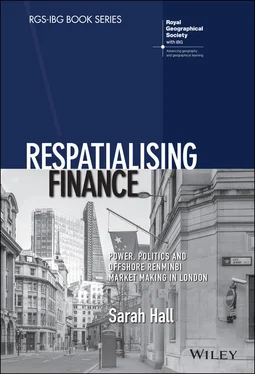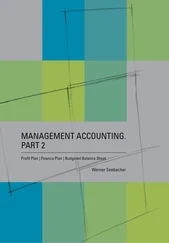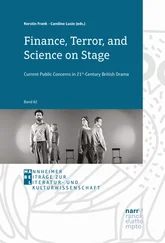Sarah Hall - Respatialising Finance
Здесь есть возможность читать онлайн «Sarah Hall - Respatialising Finance» — ознакомительный отрывок электронной книги совершенно бесплатно, а после прочтения отрывка купить полную версию. В некоторых случаях можно слушать аудио, скачать через торрент в формате fb2 и присутствует краткое содержание. Жанр: unrecognised, на английском языке. Описание произведения, (предисловие) а так же отзывы посетителей доступны на портале библиотеки ЛибКат.
- Название:Respatialising Finance
- Автор:
- Жанр:
- Год:неизвестен
- ISBN:нет данных
- Рейтинг книги:5 / 5. Голосов: 1
-
Избранное:Добавить в избранное
- Отзывы:
-
Ваша оценка:
- 100
- 1
- 2
- 3
- 4
- 5
Respatialising Finance: краткое содержание, описание и аннотация
Предлагаем к чтению аннотацию, описание, краткое содержание или предисловие (зависит от того, что написал сам автор книги «Respatialising Finance»). Если вы не нашли необходимую информацию о книге — напишите в комментариях, мы постараемся отыскать её.
Respatialising Finance
Respatialising Finance
Respatialising Finance — читать онлайн ознакомительный отрывок
Ниже представлен текст книги, разбитый по страницам. Система сохранения места последней прочитанной страницы, позволяет с удобством читать онлайн бесплатно книгу «Respatialising Finance», без необходимости каждый раз заново искать на чём Вы остановились. Поставьте закладку, и сможете в любой момент перейти на страницу, на которой закончили чтение.
Интервал:
Закладка:
Influenced by wider thinking on networks drawing on actor network theory as well as assemblage thinking (Callon 1986; DeLanda, 2016), network approaches to global finance emphasise the range of actors, institutions and materialities, and crucially the interdependencies between them, in shaping the international financial system. Most importantly for my focus on international financial centres (IFCs), a considerable body of work has developed that emphasises the role of financial districts within global cities in choreographing international financial networks (Castells 2009; Friedmann 1986; Lavery et al. 2018; Sassen 2001). In order to fulfil this role in shaping a range of different types of global financial networks, these international financial districts contain significant clusters of financial and related advanced producer services firms notably law, accountancy and insurance firms. They also typically include a range of regulatory functions that shape the nature of financial processes and practices (Hall 2018). Given the significance of IFCs to the contemporary international financial system, a range of different literatures have developed that includes examining: the changing nature of their elite labour markets (Beaverstock and Boardwell 2000; Hall 2009; McDowell 1997); detailed accounts of everyday working life within these centres (Thrift 1994); and understandings of their political economic power beyond the realm of financial markets (Augar 2001).
Whilst the power of IFCs within global finance clearly pre-dates the 2007–2008 financial crisis, these centres serve to crystallise and reveal some of the most profound changes taking place within global finance. For example, during the 2000s, a focus on the financial labour markets within IFCs revealed a growing trend for quantitatively skilled financiers capable of working on the securitised financial markets that were central to both the period of finance-led growth in the 2000s and the ensuing financial crisis (Hall 2006; Hall and Appleyard 2009). Building on this work on elite financial labour markets, the initial motivation for the research project that underpins this book came from a growing recognition that the geographical composition of these labour markets was changing quite profoundly. In particular, I was struck by the growth of Chinese nationals working in IFCs, notably in London from the early 2010s onwards. This became the subject of several national newspaper headlines as headhunters struggled to recruit the number of mandarin speaking financiers demanded in London’s financial district and Chinese state-owned banks began operating in the heart of London’s international financial district (see, for example, Stafford 2015). Previous work has clearly demonstrated how other waves of internationalisation have shaped London as an IFC and by extension the international financial system, most notably the rise of investment banking business models led by US and later European banks at the expense of British merchant banking (Kynaston 2002). However, in the mid-2010s, very little had been written about the rise of Chinese financial institutions in London.
In Respatialising Finance , I explore how work on the changing nature of international finance as read through IFCs can be used to understand how and why London’s financial centre became the partner of choice for both Chinese state policy regarding RMB internationalisation and Chinese financial institutions who sought to benefit from it. In so doing, I use the case of RMB internationalisation in London to develop a sympathetic critique of existing work in economic geography and more widely within the social sciences on international financial centres. This work has done much to explain how and why a small number of financial districts play a vital role in shaping global monetary and financial relations. However, processes of RMB internationalisation reveal that more attention needs to be paid to the political as well as the economic relations that underpin international financial centres. As the analysis in the rest of this book shows, it is very hard to understand RMB internationalisation without studying the role of the Chinese state and the People’s Bank of China in particular in initiating the process, and through regulatory decisions, continuing to shape the parameters of its size and scope. As such, whilst private sector advanced producer services firms are involved in the process, actors which are heavily studied within extant work on IFCs, the case of RMB internationalisation suggests that a broader range of actors – including policymakers and regulators as well as the political contexts in which financial markets are made – need to be given more attention than has typically been the case hitherto.
The case of RMB internationalisation also indicates how work on the spatial imaginaries of IFCs themselves can also be helpfully developed. In much of the work on IFCs to date, they are assumed, albeit implicitly, to be facilitators of global financial flows through the networks of advanced producer service (APS) firms that cluster within them. However, if we attend to the politics of these networks, by extension the analysis in Respatialising Finance calls for a more active understanding of IFCs beyond that of more passive containers. This approach draws attention to the ways in which IFCs themselves are changed by as well as changing global finance.
Politics, Power and Respatialising Understandings of International Financial Centres
In order to develop understandings of IFCs within RMB internationalisation, I locate my analysis within work on international political economy that has been centrally concerned with RMB internationalisation. Indeed, whilst the geographical literature had paid relatively little attention to the process of RMB internationalisation and Chinese financial market reform more widely, there is a growing literature led by international political economy (IPE) scholars (Eichengreen 2012; Prasad 2017). This literature draws on wider debates in international political economy that are broadly concerned with the intersection between money and state power (and interestingly, whilst recent geographical scholarship on international finance has typically focused on finance, IPE work has tended to focus on money). This work explores how currency competition contributes to the changing distribution of power internationally (Cohen 1998).
Although the title of Benjamin Cohen’s book is The Geography of Money , it is striking that this focus on the international political, economic and social relations of money have not been widely studied within recent work economic geography. This comes despite the fact that earlier work on the geographies of money and finance draws heavily on insights from international political economy in the study of some of the key transformations in global finance such as the implications of the collapse of Bretton Woods and the associated ending of the gold standard for the international financial system (Leyshon and Thrift 1997; Leyshon and Tickell 1994; Strange 1986). Whilst economic geography research on money and finance turned its attention increasingly to financial centres and financialisation, for scholars working in an IPE tradition, a key concern remained as to how increased cross-border monetary flows prompted changes in state power within the international financial system (Cerny 2010; Cohen 2017). More recent work has explored how such power constraints are particularly acute for developing countries because of their relative inability to borrow from global financial markets (Alami 2018). However, whilst it is in IPE that the fullest engagement by social sciences with RMB internationalisation can be found, the research presented in this book points to two limitations of this literature.
Читать дальшеИнтервал:
Закладка:
Похожие книги на «Respatialising Finance»
Представляем Вашему вниманию похожие книги на «Respatialising Finance» списком для выбора. Мы отобрали схожую по названию и смыслу литературу в надежде предоставить читателям больше вариантов отыскать новые, интересные, ещё непрочитанные произведения.
Обсуждение, отзывы о книге «Respatialising Finance» и просто собственные мнения читателей. Оставьте ваши комментарии, напишите, что Вы думаете о произведении, его смысле или главных героях. Укажите что конкретно понравилось, а что нет, и почему Вы так считаете.












